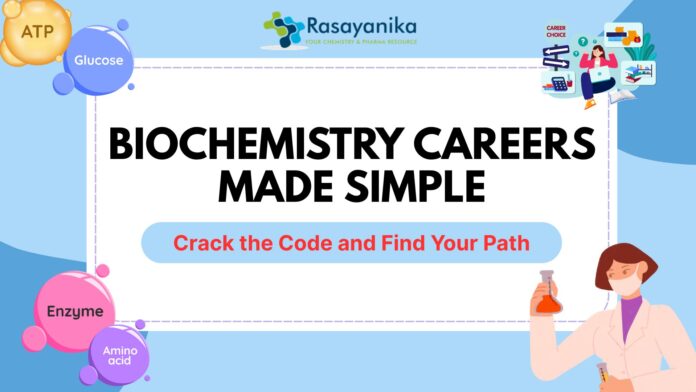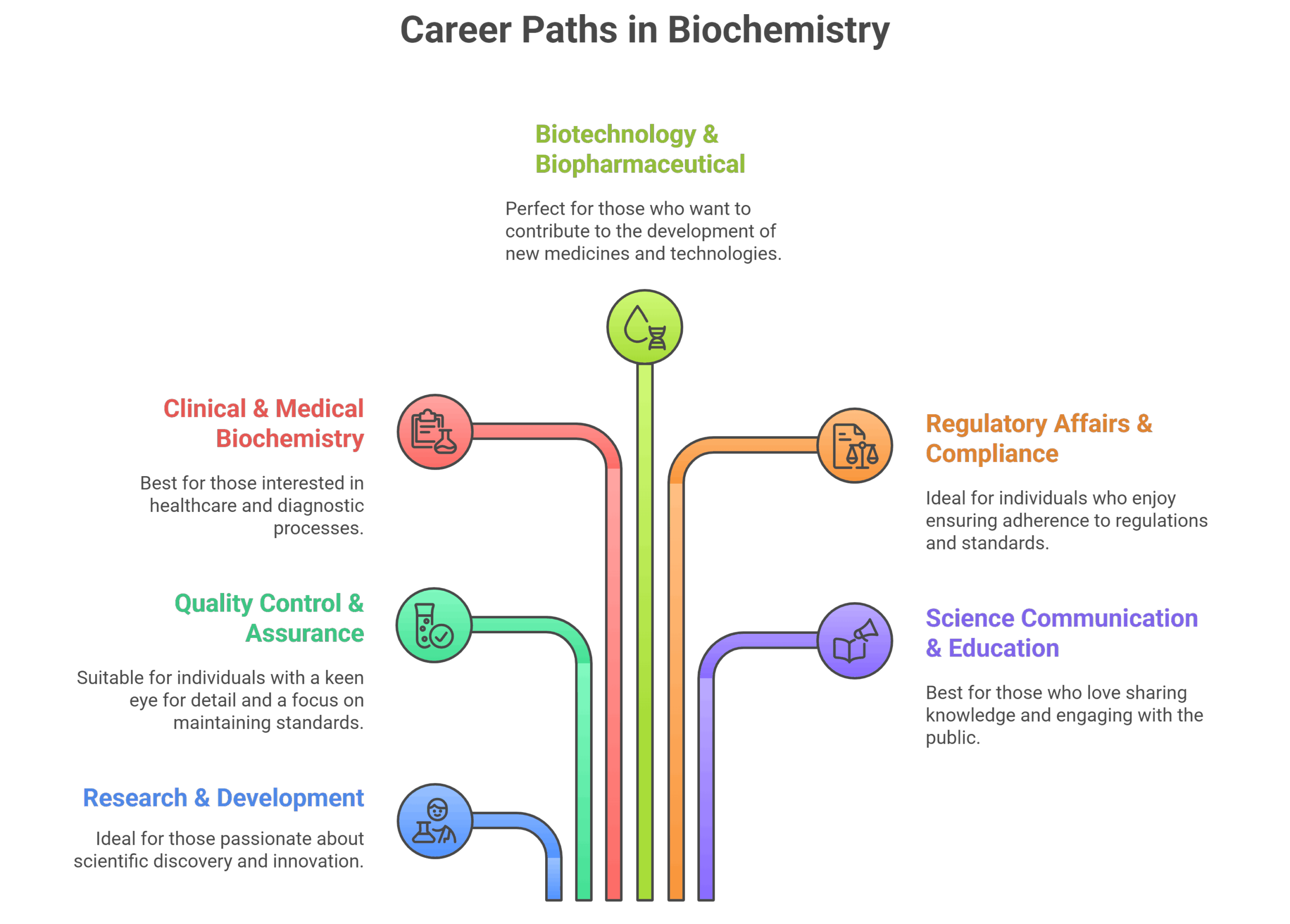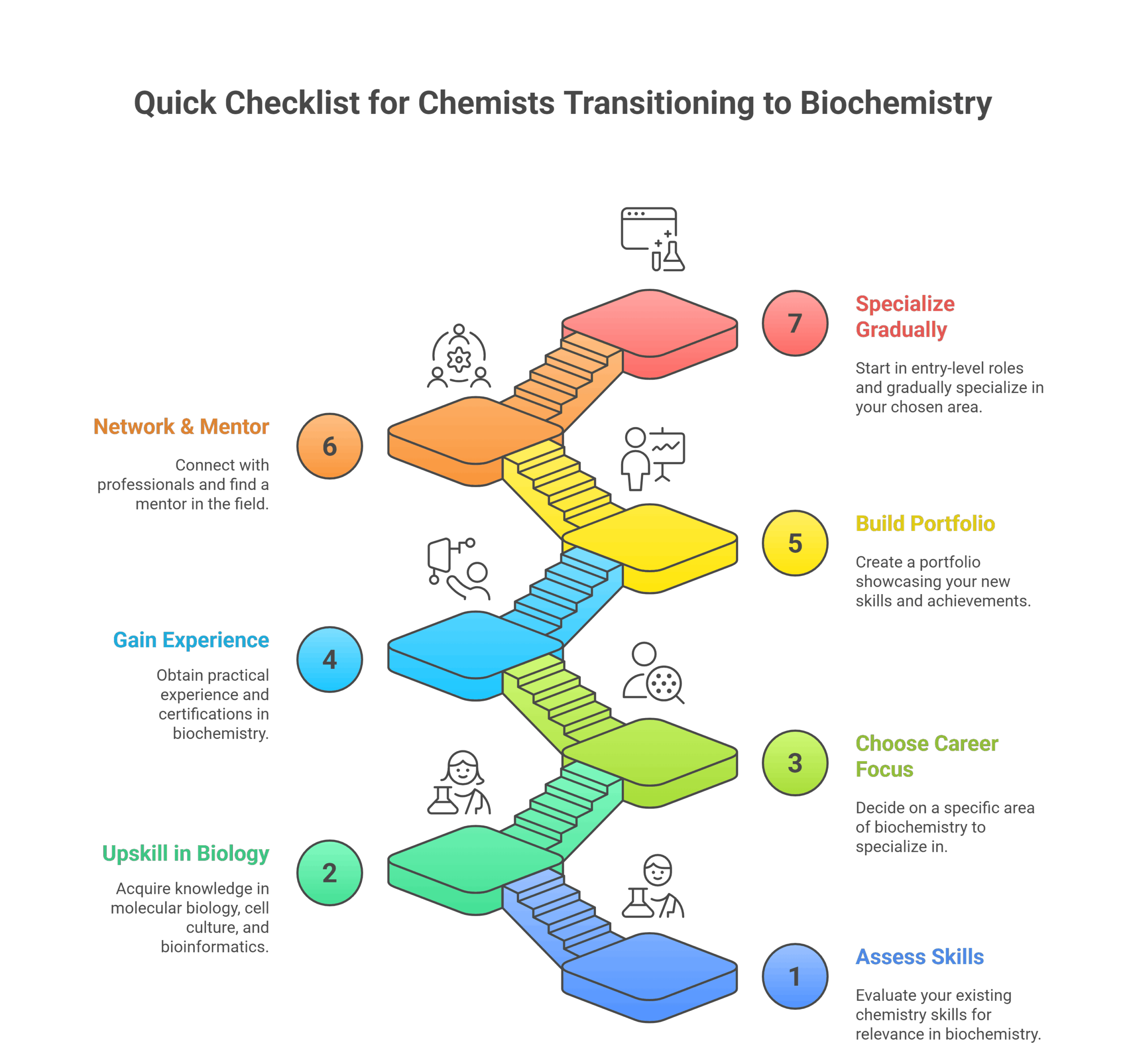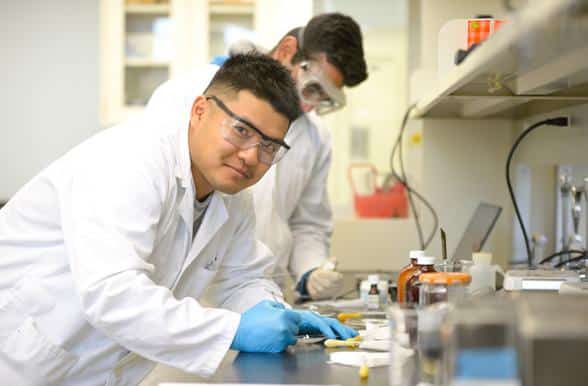Biochemistry Career Pathways for Chemists – Crack the Code with These Visual Maps
Imagine your career as a chemical reaction, and you would find that some paths are linear, some have branching chains, a few catalysts and hurdles along the way. Biochemistry Career is always seen as pathways, test tubes, and reactions, but we never knew it was a vast world of opportunities.
Are you one of the students who gets scared at the thought of Biochemistry? The formulas, complex pathways, the endless cycle, it can feel like a maze that you don’t want to enter. But for people who enjoy it, Biochemistry is like a treasure.
There are so many career options in Biochemistry, and it is really difficult to navigate and choose one. With so many questions like “Should I enter into drug discovery, metabolic research, or clinical Biochemistry?” You are not alone. This article will help you understand the career options better. Think of this as your roadmap, showing every route in the world of Biochemistry careers.
In this guide, you will discover hidden pathways and figure out the career options that align with your skills, passions, and goals. Continue reading to decode the Biochemistry career path .
Chemistry Career vs Biochemistry Career
This question of “Are Chemistry and Biochemistry careers different? is common amongst students. To answer this in short, yes, they are different, and there are various career opportunities in both fields. Chemistry careers often focus on materials and reactions in non-living systems, while Biochemistry opens doors to life sciences, healthcare, and the advanced biotech sector.
If you are someone who loves chemistry and biology, Biochemistry will give you the best opportunity to pursue a career that can directly impact human health and the environment
Biochemistry Career Pathways
For chemists who are looking to explore the biological side of science, Biochemistry offers a lot of career opportunities across research, healthcare, industry, and more. Let us look into the important career pathways, roles, and the skills you need.
In Research & Development (R&D) Careers
Role: The 3 major roles are to be seen: Scientist / Research Associate / Principal Investigator
Companies that hire for various roles: Pharmaceutical companies (Pfizer, Novartis), biotech startups, academic labs
Skills Required:
- Molecular biology techniques (PCR, western blotting, ELISA)
- Protein chemistry and enzyme assays
- Creative Thinking and Experimental Design
- Data analysis (Excel, R, Python)
This Role is Suitable for: If you are someone who loves discovery, solving science questions, and publishing papers, R&D is the place for your curiosity.
For Quality Control (QC) and Quality Assurance (QA)
You will work as: QC Analyst / QA Specialist / Lab Manager
Employers: Biopharma companies, Diagnostic Labs, Food & Beverage Industry
Skills Required:
- There are a few Analytical techniques, like HPLC, GC,and spectrophotometry which are important
- Basic Knowledge on Regulatory Guidelines such as ISO, GLP, GMP is a must
- You should pay attention to detail and have problem-solving mindset
- Documentation and Reporting Skills
Why it Fits You: This role is ideal for chemists who enjoy precision, accuracy, and standard workflow.
Clinical & Medical Biochemistry
Role: Here are a few roles: Clinical Biochemist / Laboratory Scientist / Diagnostic Specialist
List of Employers: Hospitals, Diagnostic Labs (Thyrocare, SRL), Research Hospitals
Skills Required:
- Able to perform Blood, urine, and tissue sample analysis
- Understanding of human physiology and disease biomarkers
- Knowledge on Lab automation and diagnostic instrument handling
- Good Communication skills for reporting results to the doctors
This works well for: This role fits perfect for chemists who are interested in healthcare, patient outcomes, and bridging lab science with medicine.
Biotechnology & Biopharmaceutical Careers
Role: Bioprocess Scientist / Biotech Researcher / Product Development Scientist are a few major career roles
Employers who recruit: Biotech startups, Vaccine Companies, Enzyme Production Labs
Skills Required:
- Well-versed with Cell culture and fermentation techniques
- Knowledge on bioprocess optimization and scale-up
- Able to perform molecular cloning and genetic engineering
- Should be a good team player and be good at project management
Ideal For: This role is great for people who enjoy innovation, working with living systems, and developing products like vaccines, enzymes, or therapeutics.
Regulatory Affairs & Compliance Careers
Role: Important Roles in this field are Regulatory Associate / Documentation Specialist / Compliance Officer
Example Employers: Pharma, Biotech, Medical Device companies hire candidates at regular intervals
Skills Required:
- Knowledge of FDA, EMA, and ICH guidelines
- Able to write technical documents and perform regulatory submissions
- Ability to pay attention to detail and do critical evaluation
- Coordination with cross-functional teams
Why it Works: For chemists who prefer paperwork to management role, ensuring scientific products meet legal and ethical standards.
Science Communication & Education
Role: Scientific Writer / Educator / Lab Trainer / Science Communication Expert
Example Employers: Educational Institutions, Science Media, Pharma/Biotech companies, EdTech Companies
Skills Required:
- Writing and presentation skills
- Ability to simplify complex concepts
- Curriculum or content development
- Public engagement and teaching skills
Why it Works: Perfect for chemists who enjoy teaching, writing, or creating educational content to inspire the next generation of scientists.
Skill Roadmap for a Biochemistry Career
Want to turn your chemistry knowledge into your favorite Biochemistry career? It’s not just about knowing molecules and reactions; it’s about building a skill set that makes you ready for jobs in labs, industry, and research institutes. Here’s a roadmap to help you navigate your journey.
Core Technical Skills
These are the must-have skills that form the foundation of every Biochemistry career:
| Skill | Why It Matters | How to Learn / Upskill |
| Molecular Biology Techniques (PCR, ELISA, Western Blot) | Essential for research, diagnostics, and biotech applications | Online courses and Lab-based workshops |
| Protein Chemistry & Enzyme Assays | Key for drug development, R&D, and QC roles | Biochemistry lab classes and hands-on internships |
| Analytical Techniques (HPLC, GC, Spectrophotometry) | Critical for QC, QA, and industrial roles | Online certifications, Lab Training Programs |
| Cell Culture & Microbiology | Core for biotech, pharma, and medical research | University lab modules, Biotech Internships |
| Laboratory Safety & Compliance | Mandatory for any lab work | OSHA / ISO / GLP / GMP workshops, online courses |
Soft Skills That Give You an Upper Hand
Technical skills are important, but employers also value soft skills:
- Critical Thinking & Problem Solving – These skills are very important to analyze experiments and troubleshoot lab failures
- Communication Skills – To explain complex concepts to non-scientists or write report, communication skills should be strong.
- Project Management & Teamwork – In teamwork, to lead lab projects, collaborate with multiple teams, you have to be a good team player with management skills
- Attention to Detail – To avoid errors in experiments, QC checks, and documentation, focus on minute details is required
You can upskill through workshops, internships, or online courses on LinkedIn learning or professional societies.
How You Can Build Your Roadmap
- Start first with improving Important Lab Skills – Focus on molecular biology, protein chemistry, and cell culture.
- Learn Analytical Skills & Data Skills – Learn HPLC, GC, and bioinformatics tools.
- Gain Industry Certifications – Choose QA, QC, or GMP and get certifications to increase your chances of getting employed
- Get Hands-On Experience – Doing Internships, research projects, and lab rotations are critical and can give you good research experience
- Keep Learning & Network with scientists – Attend webinars, join professional societies, linkedin groups to network with fellow science enthusiasts and follow biotech trends.
Additional Tip: Try focusing on improving the skills according to the career path you want (R&D, QC, biotech, or clinical) and prioritize the courses you pursue accordingly. A focused blueprint can speed up your journey from chemist to a successful biochemist.
Transition Smoothly into a Biochemistry Career as a Chemist
Taking the step out from Chemistry to Biochemistry may seem like a big jump, but with a clear plan, it’s easily achievable. Here’s how chemists can transition smoothly into the world of Biochemistry.
- Strengthen Your Chemistry Foundation More
- Gain Important Biochemistry Skills through courses and certifications
- Focus on one career path and keep improving to achieve that
- Build a Strong Portfolio for Yourself
- Network effectively & Seek Mentorship from experts in your field
- Start Small, then expand your specialization
Industry Trends & Future Prospects
Biochemistry is at the forefront of transformative changes across healthcare, agriculture, and environmental science. As of 2025, the field is experiencing rapid growth and innovation because of technological advancements and a global shift toward sustainability.
Market Growth & Economic Outlook
Global Biochemical Market Expansion: The biochemical market is expected to grow from $83.52 billion in 2024 to $90.85 billion in 2025. It is also expected to have a compound annual growth rate of 8.8%. This growth is expected to happen as the demand for sustainable products, government initiatives and shift to bio-based fuels has increased.
Boom in the Biotech Sector: The biotechnology market is expected to increase from $1.74 trillion in 2025 to $5.04 trillion by 2034. This will be driven by innovations like CRISPR gene editing, AI in drug discovery, and precision medicine.
Emerging Trends that shapes Biochemistry Careers
- AI-Driven Drug Discovery: AI helps find new medicines faster by studying large set of drug compounds easily, and this increases the efficiency of drug discovery process.
- Personalized Medicine: Advances in genomics and biomarkers are allowing us to give treatments specific to individual genetic profiles, improving efficacy and reducing side effects.
- Sustainable Biochemistry: There’s a growing demand for green chemistry and sustainable practices, and this leads to eco-friendly products and processes.
- Microbiome Research: Studying the bacteria in our bodies is giving new insights into health, disease prevention, and treatment.
- Biomaterials & Tissue Engineering: Innovations in creating synthetic tissues and materials are advancing regenerative medicine and prosthetics.
Biochemistry Career Opportunities & Growth
- Job Growth: Employment of biochemists is expected to grow 6% from 2024 to 2034, faster than the average for all occupations.
- Diverse Career Paths: There are various opportunities that exist in different sectors, including pharmaceuticals, biotechnology, environmental science, and academia, and the opportunities will continue to increase.
- Global Demand: The increasing need for sustainable solutions and advancements in healthcare is increasing the demand for skilled biochemists worldwide.
Moving from chemistry to a biochemistry career is not just a casual move; it’s an adventure into the living world of molecules, cells, and novel discoveries. Whether you see yourself in R&D labs, biotech startups, or clinical diagnostics, there is a path waiting for your curiosity and skills.
Remember that your strong chemistry foundation is your superpower. Combine it with specific biochemistry skills, hands-on experience, and lots of curiosity, and you’ll be ready to handle the major scientific problems. Stay curious, keep learning, and don’t shy away from exploring new tools, technologies, and trends, because the future of biochemistry is huge, dynamic, and full of opportunities.
So, grab your pipette, speed up your data analysis, and step confidently into a career that integrates science, innovation, and impact. Your biochemistry journey starts now. Crack the code, one skill at a time!
Frequently Asked Questions about Biochemistry Career
- Is Biochemistry a Good Career?
Yes, biochemistry career offers various opportunities in research, healthcare, biotech, and pharmaceuticals with strong growth prospects.
- What careers can I pursue with Biochemistry?
You can work in R&D, clinical labs, quality control, biotech industry, bioinformatics, education, and regulatory affairs.
- Is Biochemistry a good Career in India?
Definitely, India has rapidly growing pharma, biotech, and research sectors that offer increasing demand for skilled biochemists.
- What are the careers after an MSc in Biochemistry?
After completing MSc, Biochemistry Career splits into different branches like research, lab management, biotech roles, clinical diagnostics, teaching, or further specialization like a PhD or an MBA in life sciences.


















































